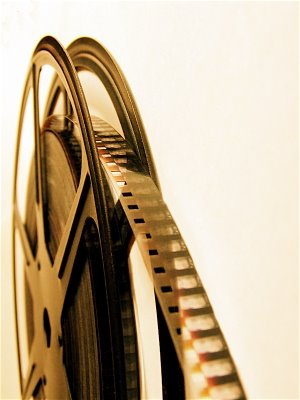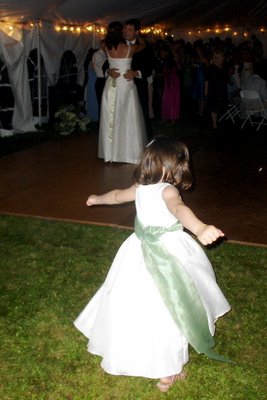
Imagine you are watching a movie. It is a really good movie. You are caught up in the plot, the drama, the characters and their lives. It has that rare quality that totally draws you in, and makes you forget entirely that you are watching a movie. Have you ever seen one like that? OK, let’s keep imagining ...
So as the story is developing, as you are sitting on the edge of your chair, wondering what twist or turn will happen next, how the characters (George and Mary) will respond to this crisis or to that opportunity. The movie has been playing for a while, so you are engrossed in the plot. Then all of a sudden, George drops his movie persona, switches his facial expressions, reverts to his natural speaking voice and accent and, turning to directly face the camera (and hence the audience), says,
“Wait a minute. Wait a minute. I just have to tell you all something. I’m not actually George. I’m really Huston Smith, a movie actor, and none of what you’ve been watching is real. I’ve just been reading a script. And frankly, you’ve reached the end of the movie. The writers just stopped it there. The director told us to act right up until the last written word, and then to just stop. But I really had to explain what was going on, because that would be just too weird, don’t you think?”As Huston Smith was giving that little out-of-character monologue, we notice the camera pan back and show the audience watching the original movie screen. They are shuffling in their cineplex stadium seats, wondering what the heck is going on. Then the camera moves in for a close-up of a older couple in the audience, looking rather perplexed, and the woman whispers to the man,
“Jim, what the heck is going on? Why did he just break out of character like that? I really wanted to see what happens next.”Jim, with a somewhat detached, pensive look in his eyes, says,
“Wait a minute Patty. I think I get it. The whole point of that movie was to shock us in our own lives. To make us realize that those actors and that situation is a metaphor for our own lives. We are living, breathing, thinking that we are caught up in a complicated drama, but in fact, that is not reality. That is only a ‘movie’ if you will. Can’t you see that? The director was trying to shock us out of our unawareness. This is some kind of attempt to help us reach a spiritual insight.”As Jim is finishing his little revelation, the camera pans back and reveals that this couple is also on a movie screen. This time however it is on a large drive-in movie screen, and we see a number of cars parked watching the movie (it continues with some more dialog fading into the background). So there is yet another audience (in cars) watching Jim and Patty perform that dialog. This is obviously a different audience, once more removed. And now the camera zooms in on another couple — sitting in a convertible — and the guy says to the girl,
“Chantel, what kind of a lame movie did you bring me to? Is this what they call a chick-flick? It doesn’t make any sense. Actors dropping out of character, audiences becoming the actors in another movie. What is going on?”This time Chantel, also looking pensive, says,
“No Dan, don’t you see — the whole point of both of those surprise transitions was to reinforce to all of us in the audience that we shouldn’t trust what we see as our own ‘dramas’. None of it is real. In fact, how do you know that you and I right now aren’t just characters in yet another movie, that some audience out there [she points toward the camera] is watching right now.”Dan says,
“Chantel, have you gone completely nuts. We’re sitting right here in this car. Touch me — I’m real. You’re real. Look back [he looks at the camera] -- there is nobody out there. Just a bunch of crickets [sound of loud crickets]. It is only us, sitting here in this car, in this drive-in.”Chantel then sees some white light coming in from the edges of the frame.
“What is that? Dan, What’s going on? I see a bright light, don’t you?”Dan says,
“Don’t worry Chantel, it’s some car or some guy with a really powerful flashlight, or something.”As the white light gets brighter, the camera fades back and takes you back toward the drive-in projection booth, where you see the flickering white light coming out of the projector. The camera keeps zooming into the white light, as you hear movie dialog fading in the background, until the screen is nothing but white light. Finally, just a solid white screen (as if you’ve gone into the light).
Long, pregnant pause. Pure white. Pure silence.
After about a minute (and this is very awkward to sit through), there is some movement, as the camera pans back off the white screen and you see it set in an ornate old-time movie theater. You see people getting up and leaving the movie theater. They appear very confused, agitated, some of them a little disgusted. Others are trying to wait to see what comes next. You watch people leaving the theater for some time. Finally, only one couple near the front remains in the theater. The guy looks over to the woman, and says,
“So Carol, what did you think? Did you get it?”And Carol says,
“Sure Steve ... at least I think so. First we were shown that our lives are no different from an actor playing a movie role. We identify with the character in our drama, but we’re not that. We are aware of that. So we don’t need to get caught up in the drama — we can be detached. Then comes another surprise, and we learn that it isn’t that simple. Even if we think we are detached from the drama, that’s not real either, for we could just as easily still be an actor playing out yet another meta-drama. We must continue to look for a deeper understanding, deeper insight. Is that right?”Steve says ,
“Wow, that’s amazing, Carol. I didn’t figure any of that out the first time I saw it. Now tell me, did you understand the final ending?”To which Carol says,
“Well, it could mean that none of those perspectives can be correct, because in each case we keep attributing our awareness to ‘me’ the individual. If those characters aren’t real, then I have to accept the fact that none of the people are real, and that’s probably because they artificially and incorrectly perceived themselves as individuals, each with separate egos. The white light — continuing the movie metaphor — indicates that we are not just actors playing dramatic roles. But that we are the light itself that projects these characters — that projects the entire movie. We are, in fact, just pure awareness. And in fact, you and I are not separate individuals, but we are really the same pure awareness.”Steve says,
“Carol that’s fantastic. You must really have an open, receptive mind.”At that point, the screen once again begins to lighten, this time because the film celluloid is starting to burn from the center outward, and we see that on the screen. As it burns it is leaving a pure bright white in its place, and Carol’s voice continues (fading),
“No Steve, not an open mind. Rather, no mind at all. Just This.”And you are left once again with pure whiteness. And that is the end of the movie.
Hey, I hoped you liked the movie. I think it would be really neat to see this actually made into a movie short. If someone wants to do that (I don’t have the wherewithal) then by all means, please do so. Just point them back to my blog when you get to the credits ;-) The egoless, undifferentiated, non-separate being known as ‘me’ ;-)


